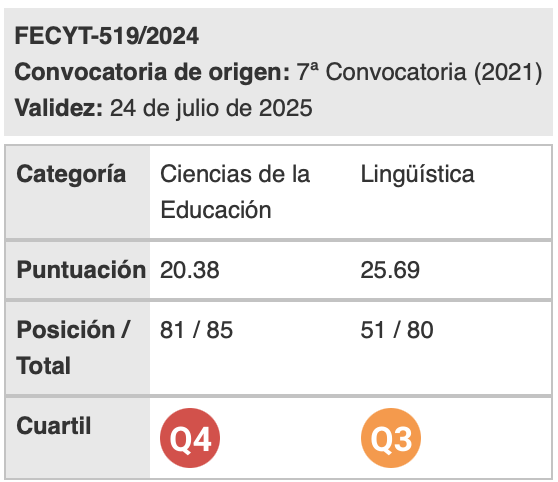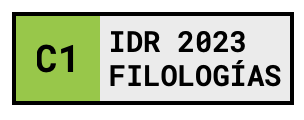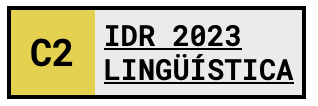MOOCs: From a constructivist approach to a reliant paradigm
Keywords:
constructivism, connectivism, complexity, paradigm, MOOC, FFE, Edgar Morin, relianceAbstract
Much has been written about the MOOC phenomenon (Massive Online Open Courses), however, this is not an ICTE (Information and Communications Technology for Educational purposes) panegyric that we offer here. Instead,the objective is to make the most of these emergent educational modalities in order to start a reflection on the value of scientific criteriain educationalresearch with a focus on French as Foreign Language (FFL). We will first show that many concepts seen as cutting edge educational innovations were actually imagined many years before. Therefore, we will see that it is only thanks to a favorable historical and technological context that the 2.0 education was born. This first point invites us to re-thinkconstructivism, the dominant paradigm for research in education, and to investigate the pertinence of this central model within the knowledge society. In fact, characteristics of complex thought, as described by Edgar Morin, allow a more integrative, thusmore realistic approach of the pedagogical equation and announce the possibility of a new paradigm: the “reliance” paradigm.
Downloads
References
Alain. (1976). Propos sur l’éducation. Paris: PUF. 15e édition augmentée. Première édition en 1932.
Baillon, R. (1990). Les consommateurs d’école. Paris: Stock.
Bauman, Z. (2013). La vie liquide [Liquid Life, 2005]. Trad. de l’anglais par Rosson, C. Paris: Hachette, coll. ‟Plurielˮ.
Bedel, C. (2014). Quelques vérités à rétablir sur les MOOC. Libération, 6 janvier 2014.
<http://www.liberation.fr/societe/2014/01/06/quelques-verites-a-retablir-sur-les-mooc_970928> [04/11/2015].
Bertalanffy von, L. (1961). Les problèmes de la vie. Essai sur la pensé biologique moderne [Das biologische Weltbild, 1949]. Traduit de l’allemand par Deutsch, M. Paris: Gallimard, coll. ‟Aux frontières de la scienceˮ.
Boghossian, P. (2009). La peur du savoir. Sur le relativisme et le constructivisme de la connaissance. Trad. de l’anglais par Deroy, O. Marseille: Éd. Agone, coll. ‟Banc d’essaisˮ.
Bowen, J. A. (2012). Teaching Naked. How Moving Technology Out of Your College Classroom Will Improve Student Learning. San Francisco: Jossey-Bass.
CESE. (2015). La pédagogie numérique: un défi pour l’enseignement supérieur. Journal Officiel de la République française. Séance du 24 février 2015.
Compagnon, A. (2014). Moocs et vaches à lait. Le Débat, nº180. 170-178.
Collectif anti-MOOC. (2013). Mooc: une étape vers la privatisation des cours. Libération, 26 décembre 2013.<http://www.liberation.fr/societe/2013/12/26/mooc-une-etape-vers-la-privatisation-des-cours_969050> [04/11/2015].
Cuq, J.-P. & Gruca, I. (2002). Cours de didactique du français langue étrangère et seconde. Grenoble: PUG.
Davidenkoff, E. (2014). Le tsunami numérique. Paris: Stock.
Finkielkraut, A. (2008). Nous autres, modernes. Quatre leçons. Paris: Gallimard, coll. ‟Folio essaisˮ. Première édition en 2005.
Fogel, J.-F. & Patino, B. (2014). La condition numérique. Paris: Points. Première publication en 2013.
Freinet, C. (1978). L’éducation du travail. Paris: Delachaux et Niestlé. Cinquième édition. Première édition en 1946.
Galisson, R. (1980). D’hier à aujourd’hui la didactique des langues étrangères. Du structuralisme au fonctionalisme. Paris: Clé International.
Guerraoui, R. (2014). Pièges à MOOC. Le Monde, 26 juin 2014. <http://binaire.blog.lemonde.fr/2014/06/26/pieges-a-mooc/> [04/11/2015].
Guité, F. (2010). Le connectivisme. <http://www.francoisguite.com/2004/12/le-connectivisme-neo-socioconstructivisme/> [30/10/2015].
Halté, J.-F. (1998). La didactique du français. Paris: PUF, coll. ‟Que sais-je?ˮ. 3ème édition. Première édition en 1992.
Illich, I. (1971). Une société sans école [Deschooling Society, 1970].Trad. de l’anglais par Durand, G. Paris: Seuil, coll. ‟Pointsˮ.
Khan, S. (2013). L’éducation réinventée. Une école grande comme le monde. [The One World Schoolhouse: Education reimagined, 2012]. Traduit de l’anglais par Chambon, P. Paris: JC Lattès.
Kuhn, T. S. (2008). La structure des révolutions scientifiques. [The Structure of Scientific Revolutions, 1962]. Trad. de l’américain par Meyer, L. Paris: Flammarion, coll. ‟Champs/Sciencesˮ. Seconde édition augmentée de 1970.
Lojacono, F. (2009). Le rôle de l’enseignant: enfin du nouveau? Cuadernos de Lingüística de la Universidad de Puerto Rico, vol 2(2), 33-39.
Mérieu, P. (1996). Frankenstein pédagogue. Paris: ESF.
OCDE. (2013). Les grandes mutations qui transforment l’éducation 2013. Paris: OCDE.
<http://dx.doi.org/10.1787/trends_edu-2013-fr> [30/10/2015].
Morin, E. (2015). L’aventure de La Méthode suivi de "Pour une rationalité ouverte". Paris: Seuil.
Perrenoud, P. (1993). L’école face à la complexité. <http://www.unige.ch/fapse/SSE/teachers/perrenoud/php_main/php_1993/1993_01.html> [30/10/2015].
Polony, N. (2014). Ce pays qu’on abat. Chroniques 2009-2014. Paris: Le Figaro-Éditions Plon.
Prost, A. (1985). Éloge des pédagogues. Paris: Seuil.
Puren, C. (2011). Les composantes de la complexité. <http://www.christianpuren.com/biblioth%C3%A8que-de-travail/046/> [05/11/2015].
Reboul, O. (1981). La philosophie de l’éducation. Paris: PUF. 3ème édition revue et augmentée. Première édition en 1971.
Serres, M. (2012). Petite Poucette. Paris: Le Pommier.
Siemens, G. (2005). Connectivism: A learning theory for the digital age. International Journal of Instructional Technology and Distance Learning, 2(1), 3-10. Première publication en 2004 sur <http://www.elearnspace.org/Articles/connectivism.htm> [05/11/2015].
Siemens, G. (2012). MOOCs are really a plateform. <http://www.elearnspace.org/blog/2012/07/25/moocs-are-really-a-platform/> [05/11/2015].
Zourou, K. (2007). Paradigme(s) émergent(s) autour des apprentissages collectifs médiatisés en langues. Alsic, Vol. 10, n° 2. [28/10/2015].
Wieruszowski, H. (1966). The Medieval University: Masters, Students, Learning. Princeton, New Jersey: D. Van Nostrand Compagny Inc. (An Anvil Original).
Downloads
Published
How to Cite
Issue
Section
License
Authors who publish with this journal agree to the following terms:
- Authors retain copyright and grant the journal right of first publication with the work simultaneously licensed under a Creative Commons Attribution License that allows others to share the work with an acknowledgement of the work's authorship and initial publication in this journal.
- Authors are able to enter into separate, additional contractual arrangements for the non-exclusive distribution of the journal's published version of the work (e.g., post it to an institutional repository or publish it in a book), with an acknowledgement of its initial publication in this journal.
- Authors are permitted and encouraged to post their work online (e.g., in institutional repositories or on their website) prior to and during the submission process, as it can lead to productive exchanges, as well as earlier and greater citation of published work (See The Effect of Open Access).

Revista de Lenguas para fines específicos is licensed under a Creative Commons Reconocimiento-NoComercial-SinObraDerivada 4.0 Internacional License.
























